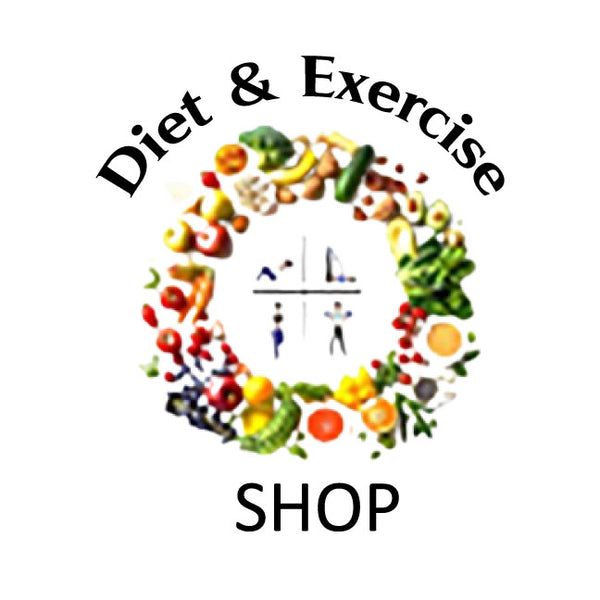
What to Eat When Exercising to Fuel Your Fitness
Figuring out what to eat around your workouts can feel like a complex puzzle. The core idea is simple: food is fuel. Getting this right is your secret weapon for unlocking better energy, peak performance, and faster recovery.
This guide will break it all down into simple, actionable steps. We'll explore how to combine carbohydrates for immediate energy, protein for muscle repair, and healthy fats for sustained power to completely transform your fitness results.
Your Guide to Fueling Your Fitness Goals
Think of your body like a high-performance car. You wouldn't put low-grade fuel in a sports car and expect it to win a race, right? The same logic applies to your body. Giving it the right fuel at the right time is critical for it to run at its best.
This isn't a secret reserved for elite athletes. Whether you're a dedicated gym-goer or just starting, dialing in your nutrition makes a world of difference.
The link between what we eat and how we perform is so powerful it has created a massive global sports nutrition market. Valued at roughly $50 billion in 2024, this industry is expected to nearly double by 2033. This explosion shows how many people are waking up to the power of smart nutrition. Discover more insights about sports nutrition trends on makersnutrition.com.
Timing and Food Choices Matter
Let's simplify things by looking at your nutrition in three distinct windows: before, during, and after your workout. Each phase has a unique goal, so your food choices will change.
- Pre-Workout: The main goal here is to top off your energy tanks. You need easily digestible carbohydrates for a ready source of fuel.
- Intra-Workout: For longer sessions, the focus shifts to maintaining energy levels and staying hydrated. This usually involves simple carbs and electrolytes.
- Post-Workout: This window is all about recovery and rebuilding. Your body needs protein to repair muscle fibers and carbs to restock the energy you just burned.
We'll dive deep into each of these phases. But to get you started, here's a quick cheat sheet summarizing what to eat and when.
Workout Nutrition At A Glance
This table gives you a quick summary of what to eat and when to eat it to optimize your exercise routine.
| Timing | Primary Goal | Recommended Foods |
|---|---|---|
| Pre-Workout (1-3 hours before) | Top off energy stores, fuel performance | Oatmeal, banana, whole-wheat toast with peanut butter, Greek yogurt |
| Intra-Workout (For workouts > 60-90 mins) | Maintain energy, sustain hydration | Sports drinks, energy gels, easily digestible fruit (like a banana) |
| Post-Workout (Within 1-2 hours after) | Replenish energy, repair muscle tissue | Protein shake, chicken breast with rice, chocolate milk, eggs with toast |
Think of this table as your starting point for building a smarter nutrition plan.
"A solid recovery nutrition plan helps to prevent injuries and allows the body to rebuild itself after the stress of exercise."
By mastering these fundamentals, you can stop guessing and start fueling your body with intention. This is how you create a personalized plan that amplifies your hard work and helps you crush your goals.
Fueling Up Before Your Workout
Think of your body like a high-performance car. You wouldn't start a long road trip with an empty gas tank, right? The same logic applies to your workouts. What you eat beforehand is the premium fuel that determines how hard you can go and for how long.
Skipping this step is a recipe for a stalled-out session. You just won't have the horsepower to perform at your best.
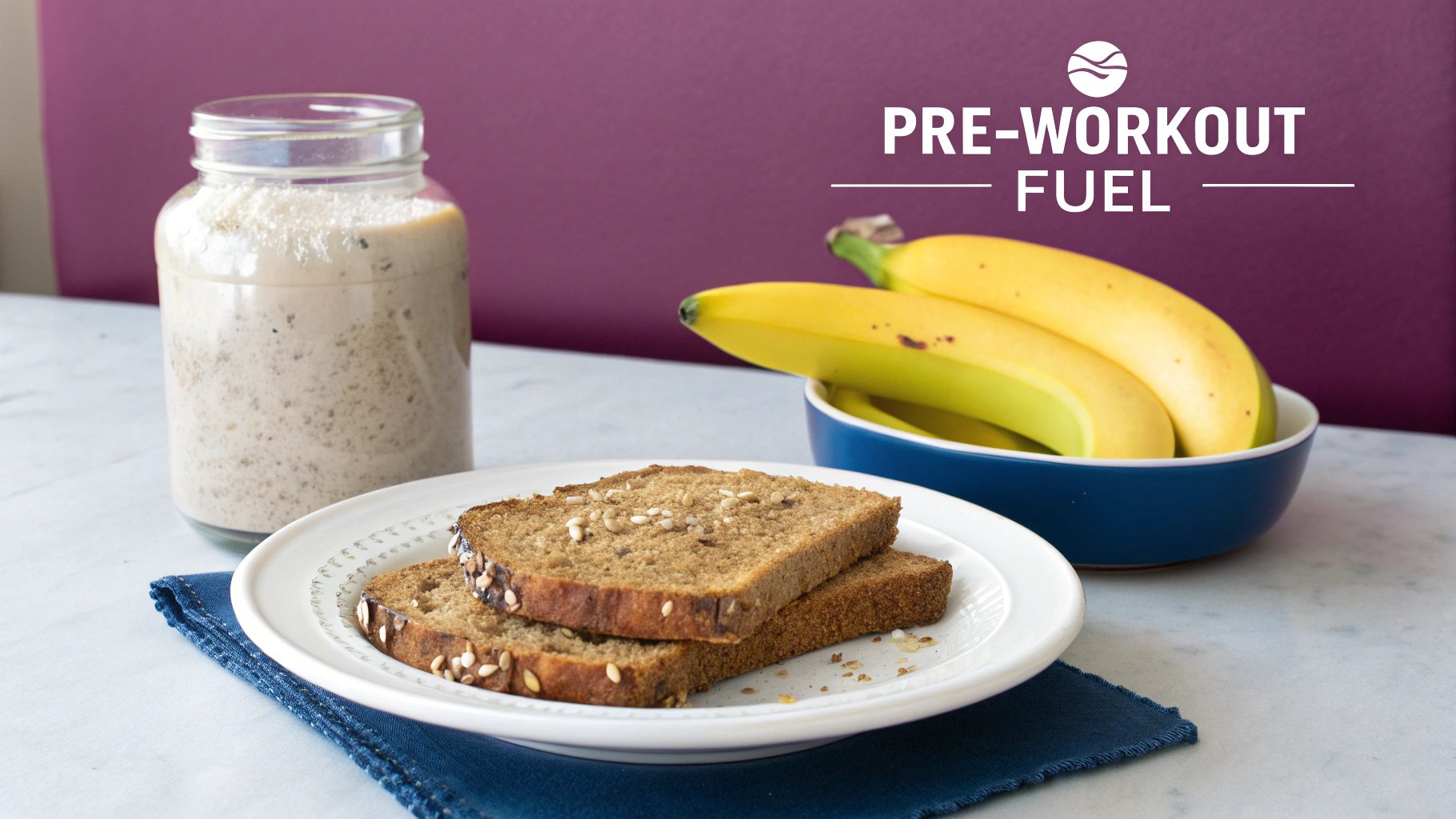
When it comes to pre-workout nutrition, timing is just as important as the food itself. If you're having a complete meal, give yourself a good 2-3 hours to digest. For a lighter snack, 30-60 minutes before you start is the sweet spot. This gives your body enough time to make that energy available right when you need it.
The Power of Carbohydrates and Protein
Carbohydrates are your body’s go-to fuel source. They're the fast-burning energy that powers every single rep, step, and explosive movement. When you eat carbs, your body converts them to glucose, which your muscles eagerly soak up. Run low on carbs, and you'll feel it—that sluggish, can't-push-through-it feeling.
But don't forget about protein. It plays a crucial supporting role. A little bit of protein before you train helps protect your muscle tissue from being broken down for energy. It gets the recovery process started before you’ve even racked your last weight.
"Exercise breaks down muscle fibers, and protein helps rebuild them. This nutrient is key for muscle repair and recovery."
This one-two punch of quick-acting carbs for energy and a bit of protein for muscle preservation sets you up for a truly effective workout.
Perfect Pre-Workout Product Pairings
Sometimes life gets in the way. For days when you're rushing, a quality pre-workout supplement is a fantastic tool. Our Energy Boost Pre-Workout Powder is formulated to give you that clean, sustained energy kick without weighing you down.
It’s a lifesaver for early morning sessions. Just mix it with water, and you have the fuel you need. For even more ideas, check out our guide to the best pre-workout snacks.
To create the ultimate pre-workout cocktail, try pairing a supplement with a small, easy-to-digest carb source.
- For Maximum Energy: A scoop of our Energy Boost Pre-Workout Powder in water.
- Paired with a Natural Carb: A small banana or a few dates on the side.
This simple stack gives you both the immediate jolt from the pre-workout and the steady-burning fuel from the carbs. You'll have everything you need to crush your workout.
Staying Strong During Your Workout
If you’re hitting the gym for an hour or less, just sipping on water is usually all you need. But for longer, more grueling sessions—like a long-distance run—what you take in during the workout can make or break your performance.
Intra-workout nutrition is all about keeping your energy and hydration levels topped off to avoid hitting a wall. It’s about giving your body a fast, easily digestible source of fuel so it can keep firing on all cylinders.
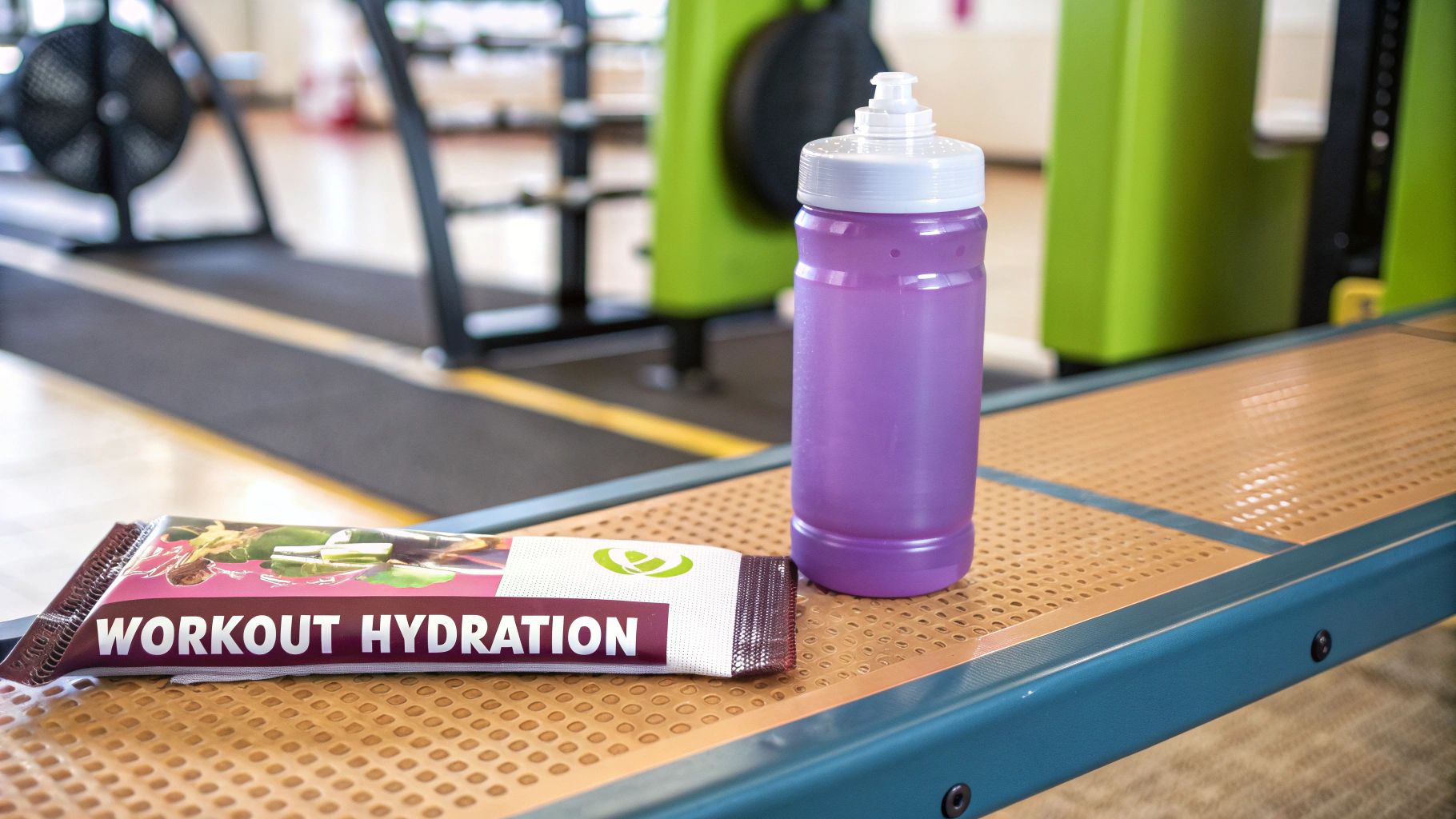
Sustaining Energy and Preventing Fatigue
The main goal during a prolonged workout is to keep your blood sugar from crashing. You need carbohydrates that your body can absorb and use almost instantly. It’s like adding a splash of gas to the tank while the car is still moving.
And it’s not just about fuel. When you sweat, you're also losing crucial minerals called electrolytes, primarily sodium and potassium. Topping these up is the secret to staving off muscle cramps, dizziness, and that drained feeling.
Intra-workout fuel becomes non-negotiable if you’re training for endurance events or tackling multiple sessions in one day. It’s the bridge that ensures your performance doesn’t nosedive.
Smart Intra-Workout Choices
So, what should you reach for mid-session? The answer is simple: things that are easy to get down and fast to absorb. The last thing you want is your body diverting energy to digest complex food.
Here are a few go-to options for refueling on the move:
- Sports Drinks: These are purpose-built to deliver a quick shot of carbs and electrolytes.
- Energy Gels: These are a super-concentrated dose of simple carbs that are easy to down on the go.
- Simple Fruits: A banana or a couple of dates are great natural sources of sugar.
For a great all-in-one solution, our Hydrate & Replenish Electrolyte Mix is a perfect choice. Just mix it with water for a drink designed to keep you hydrated while restoring key minerals lost through sweat. It's built to keep you going strong, from the first rep to the last.
Want to learn more? Check out this expert breakdown on The Truth About Intra-Workout Drinks from the Diet & Exercise channel for a deeper dive.
Optimizing Recovery After Your Workout
What you eat after you train is just as important as your pre-workout meal. This post-exercise period is your body's repair crew clocking in. After you've pushed your limits, your muscles need nutrients to rebuild stronger.
The two MVPs of post-workout recovery are protein and carbohydrates. Protein delivers the amino acids—the building blocks—your body needs to repair muscle fibers. At the same time, carbs are essential for restocking the glycogen you just torched.
Kicking Off the Repair Process
You've probably heard about the "anabolic window," that mythical 30-minute timeframe. The good news? It's largely been debunked. You don't need to sprint from the squat rack to the shaker bottle.
That said, timing isn't irrelevant. Aiming to get a solid recovery meal in within a couple of hours post-workout is a fantastic strategy. It helps maximize the repair process and can cut down on muscle soreness.
This infographic gives a great visual breakdown of what effective post-workout nutrition looks like.
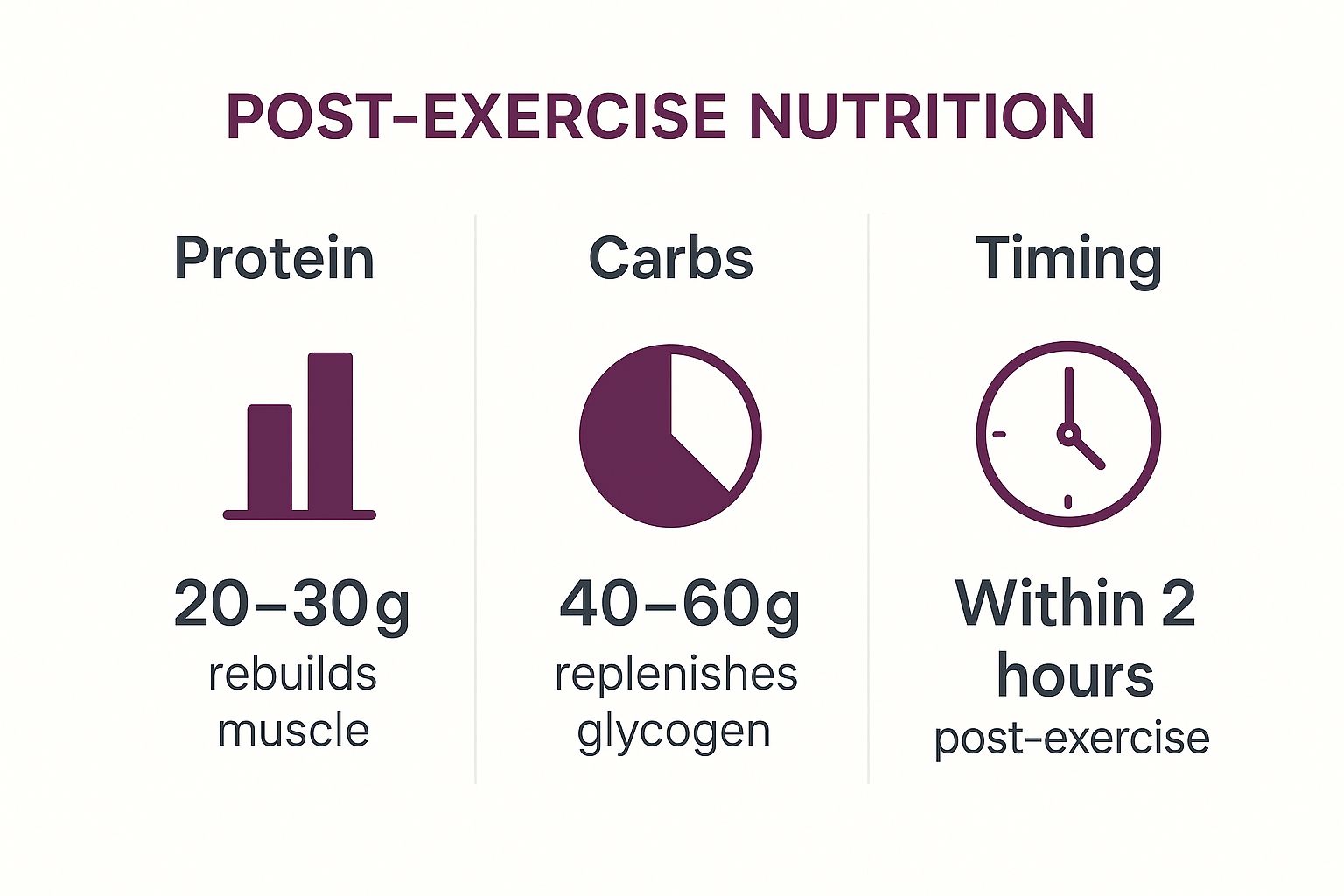
A simple formula is to consume 20-30 grams of protein alongside 40-60 grams of carbs within about two hours of finishing. This gives your body exactly what it needs to get to work.
"A solid recovery nutrition plan helps to prevent injuries and allows the body to rebuild itself after the stress of exercise."
This focus on smarter recovery is driving massive growth in the sports nutrition market. The industry was valued at $45.24 billion in 2023 and is projected to skyrocket to $75.00 billion by 2030. That growth is fueled by athletes who want to get the best results from their hard work.
Your Go-To Recovery Shake
When you want convenience and speed, nothing beats a well-made protein shake. Your body can absorb nutrients from a liquid meal much faster than from solid food, giving your muscles a head start on recovery.
Our Pure Recovery Whey Protein Isolate was created specifically for this moment.
Its formula is designed for rapid absorption, ensuring crucial amino acids get to your muscles right when they need them most. It's also packed with BCAAs (Branched-Chain Amino acids), which are key players in kickstarting muscle repair.
For a simple and delicious recovery shake, just blend a scoop with a banana and some milk. If you're looking for more ideas, dive into our guide on the best post-workout recovery foods.
Tailoring Nutrition to Your Fitness Goals
Your nutrition plan should be built for the goal you're chasing. A marathon runner doesn't train like a powerlifter, and they shouldn't eat the same way. When you sync up your eating with your fitness goals, you're not just working harder; you're working smarter.
Eating to Build Muscle
If you want to pack on muscle, you need to give your body raw materials. This means a strategic calorie surplus—eating slightly more calories than you burn. The quality of those extra calories makes all the difference.
Your most important tool here is protein. A steady, high-protein intake delivers the amino acids your muscles need to repair and grow. For a convenient way to hit those higher numbers, our Lean Mass Gainer provides a clean mix of quality protein and complex carbs, perfect for supporting a serious bulking phase.
Fueling for Fat Loss
When the goal is to lose weight, we flip the script. Now, the mission is a sustainable calorie deficit—burning more calories than you take in. Starving yourself is a surefire way to lose motivation and muscle.
In a deficit, protein becomes your best friend. It helps you feel full and satisfied, making it easier to stick to your calorie budget. It also helps protect your hard-earned muscle from being used as fuel. To give you an extra push, a product like our Thermo Shred Fat Burner can help support your metabolism and keep your energy up.
Powering Endurance Performance
For endurance athletes—runners, cyclists, and swimmers—carbohydrates are king. The entire game is about maintaining high energy levels. This means smart carbohydrate loading before big events and strategic fueling during workouts to keep your muscle glycogen topped off.
This doesn’t mean you ignore protein and fats, but the timing and amount of your carb intake become the main event. You'll focus on easily digestible carbs before and during training to avoid hitting that infamous "wall."
It's no surprise that the sports nutrition industry has exploded beyond bodybuilding. North America alone accounts for $22.3 billion in retail sales. discover more insights about the US sports nutrition market on glanbianutritionals.com.
To make these different approaches clear, I've put together a simple table that breaks down the main focus for each goal.
Nutrition Strategies For Different Fitness Goals
| Fitness Goal | Calorie Focus | Macronutrient Priority | Recommended Product |
|---|---|---|---|
| Muscle Gain | Calorie Surplus | Protein & Carbs | Lean Mass Gainer |
| Weight Loss | Calorie Deficit | Protein | Thermo Shred Fat Burner |
| Endurance | Calorie Sufficiency | Carbohydrates | Hydrate & Replenish Electrolyte Mix |
As you can see, there's a clear method to the madness. A targeted nutrition strategy is your most powerful tool.
Hydration and Supplements That Work
It’s easy to focus on protein, carbs, and fats, but we can't forget two other game-changers: hydration and smart supplementation. Nailing these two ensures all your effort counts.
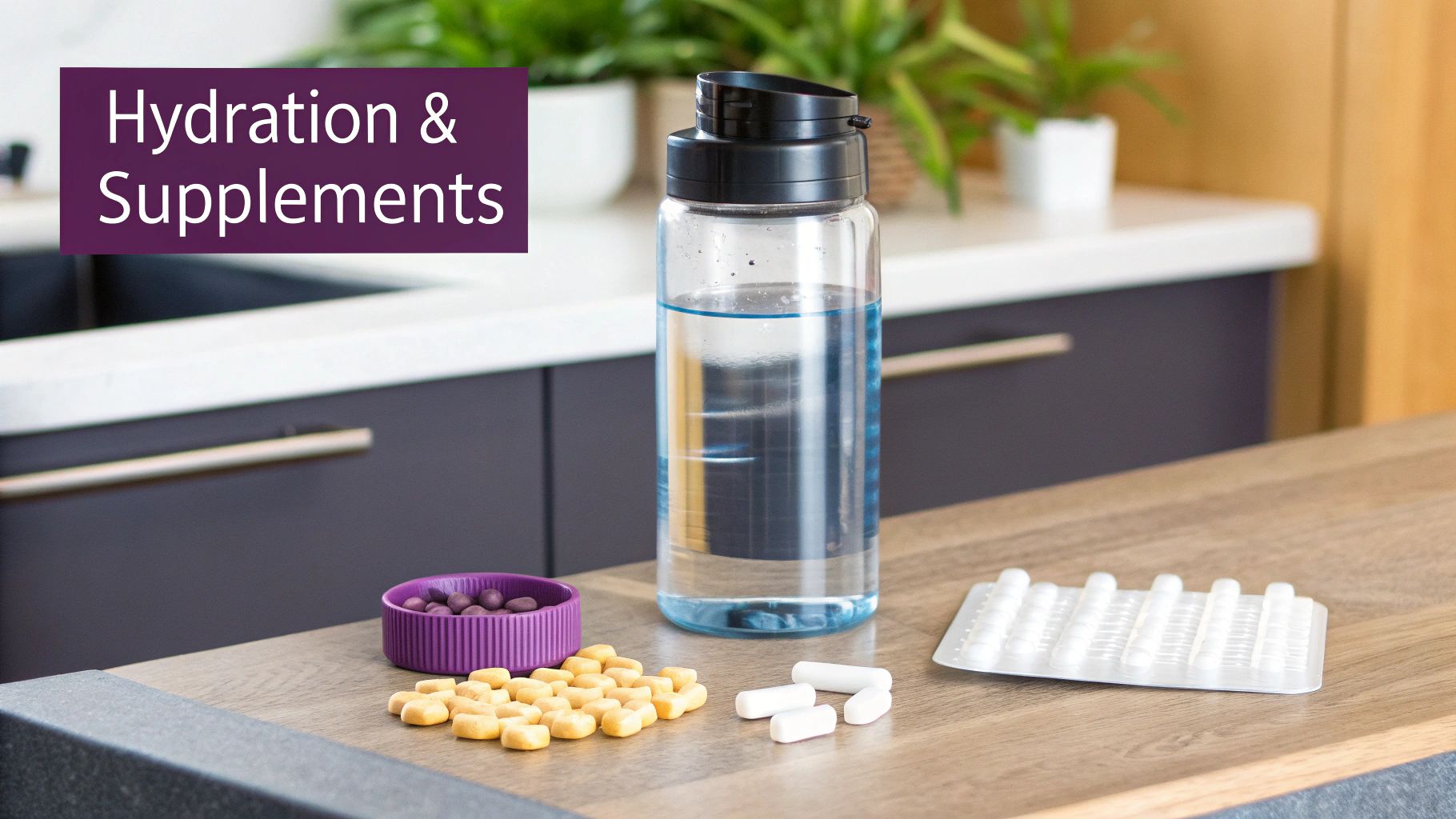
Water is your body's unsung hero. It regulates your temperature, gets nutrients to your muscles, and keeps your joints moving freely. Even being a little dehydrated can cause your performance to tank.
Mastering Your Hydration
Proper hydration is an all-day affair. The best strategy is to sip water consistently. A simple trick is the color check—aim for pale yellow urine. For most of us, this just means having water with meals and keeping a bottle nearby.
If you're gearing up for a long, sweaty session, you're losing electrolytes. Grabbing a drink that contains electrolytes helps your body hold onto water and can stave off cramps. You can get a deeper dive by checking out this video on hydration myths from the Diet & Exercise channel.
Smart Supplementation For an Extra Edge
Supplements aren’t magic. They're designed to supplement a solid diet. Over at dietexerciseshop.com, we focus on clean, effective supplements that support your hard work.
Here are a few proven staples that can make a real difference:
- Creatine: This is the most studied supplement in existence. It’s consistently shown to boost strength, power, and muscle growth by helping your muscles produce energy.
- BCAAs (Branched-Chain Amino Acids): These are the building blocks for muscle protein. Sipping on BCAAs can help reduce muscle soreness and kickstart recovery.
- Multivitamin: Think of a good multivitamin as your daily nutritional safety net. It ensures you’re not missing key micronutrients your body needs to function at its best.
By adding something like our Daily Wellness Multivitamin to your routine, you cover your foundational needs so you can focus on performance.
Got Questions About Workout Nutrition? We've Got Answers.
The world of workout nutrition can feel like a maze of conflicting advice. Let’s tackle some of the most common questions to help you build a fueling strategy that works for you.
Do I Really Need to Eat Right After I Train?
You've probably heard about the "anabolic window," that magic time post-workout where you have to chug a protein shake. The good news? It’s not that dramatic.
You definitely don't need to sprint from the squat rack to the locker room. However, it's still a great idea to get a solid meal with protein and carbs in your system within 1-2 hours of finishing up. This gives your body the raw materials it needs to start repairing muscle and refilling energy stores.
What Should I Eat Before a Super Early Workout?
Waking up at the crack of dawn for a workout is tough enough without trying to stomach a huge breakfast. Trying to force down a big meal can lead to cramps.
The key here is something small and fast-acting about 20-30 minutes before you start. Think simple:
- A banana
- A handful of dates
- A small glass of juice
This will give you a quick shot of energy without making you feel sluggish. If you prefer to train fasted, that's fine—just make sure your post-workout meal is on point to kickstart recovery.
A quick word on supplements: they're tools, not requirements. Your first priority should always be a solid diet built on whole foods. Products from dietexerciseshop.com are fantastic for convenience and performance, but they should supplement a good diet, not replace it.
At Diet & Exercise, we know that having the right gear can make all the difference. We’re all about making fitness work for you, with apparel and accessories designed to support every step of your journey. Ready to match your new nutrition know-how with some fresh gear? Check out our collections at https://dietexerciseshop.com.
